Israel’s disaster outreach does little to help its image
Spare a thought for Israel’s propagandists. It costs a pretty penny to send those relief teams across the world. Their purpose is more to rehabilitate Israel’s image than relieve suffering. After all if they want to relieve suffering they could stop trying to start wars against e.g. Iran and stop bombing Gaza.
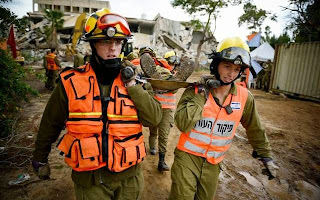 |
| Israeli aid - beware before you refuse |
.jpg) |
| Palestinian child - a victim of Israel's relief efforts |
The problem is that most coverage of such relief efforts by the mass media is concentrated on their own states and Israel doesn’t get a look in. So what can one do?
Praise oneself more and feel good it would seem. As Netanyahu puts it
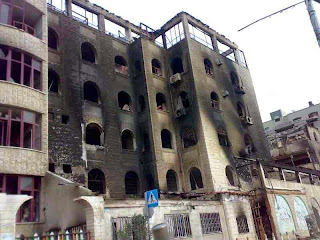 |
| Israel bombs Al Quds Hospital |
“Israel is a small country with a big heart,” he said Tuesday at a ceremony greeting the IDF delegation upon its return. “You showed the true face of the State of Israel — a state that loves life and saves life.”
 |
| Israel setting up field hospital |
Just you don’t love it? Israel a state that loves life and saves life. I suspect that’s not how it is seen from Gaza or the West Bank, but then they’re just Palestinians, not even human beings, beasts in fact. But Israelis have no doubts. When they’re not dropping phosphorous bombs on schools or cluster munitions they just love life, all life, even non-Jewish life.
Pass the sick bag Alice!
Tony Greenstein
 |
| Netanyahu telling his army relief team how much Israel loves life (as long as it's not Palestinian) |
By all objective measures, the Israel Defense Forces’ efforts to provide relief to Nepal after a devastating earthquake last month was impressive. Israel’s 250-plus humanitarian delegation to Kathmandu, which treated 1,600 injured and sick and assisted in more than half a dozen births, was the second largest of any country that sent aid.
 |
| Israeli & Nepalese army |
Providing emergency disaster relief has become something of an Israeli tradition. Jerusalem sends help almost wherever and whenever calamities occur: Rwanda, Haiti, Japan, the Philippines and even Turkey and Egypt (in 2004, members of the IDF’s Medical Corps and search and rescue teams rushed to Taba in the Sinai peninsula and stayed for three days after several explosions killed and injured dozens, including 13 Israelis).
.jpg) |
| Israel kills Palestinian baby |
Each aid delegation that rushes out brings with it accusations from critics of the Israeli government of “rubble-washing” — that Israel is providing aid in far-flung areas, at least in part, to distract from human rights violations at home.
Others argue, though, that Israel, which has mastered the art of emergency medicine, altruistically yearns to help those in need, simply because it’s the right thing to do.
 |
| War plan for Nepal - relief for Gaza |
A look at recent disaster relief operations shows that Israel could not have realistically expected any diplomatic dividends beyond slightly improving its image through worldwide coverage of its field hospitals. And that’s precisely how things have played out: A little bounce in Israel’s standing, but no substantive benefit; just the satisfaction of doing the right thing.
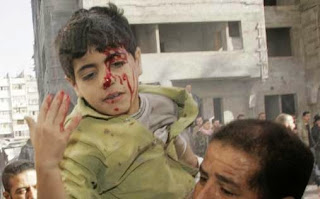.jpg) |
| Palestinian child who didn't obtain any relief |
“If we’re sending aid to Haiti, the Philippines and Nepal, we’re obviously not looking to reap great diplomatic benefits from these countries, which I might be allowed to describe as not superpowers,” said a former senior diplomat intimately familiar with Israel’s efforts to improve its public relations, who asked not to be named because of the sensitivity of the subject.
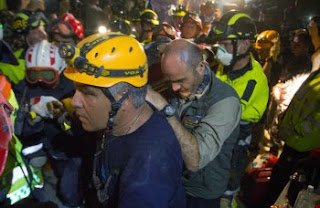 |
| Saving Nepalese woman |
None of the countries that benefited from Israeli disaster relief changed their voting pattern at the United Nations, or even regional forums. And the Foreign Ministry did not instruct its ambassadors in these countries to make aid contingent on political support in international forums, nor even hinted at linking these issues, the former diplomat noted.
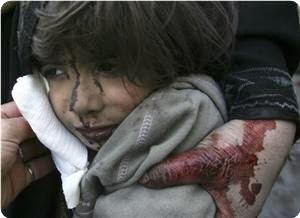.jpg) |
| Palestinian child only just survives Israel's humanitarian bombing |
Israeli and Nepalese soldiers set up a field hospital in Kathmandu on April 29, 2015 after a deadly earthquake struck the Nepalese capital. (photo credit: IDF Spokesperson)
.jpg) |
| Palestinian child - can't go to hospital because that was also bombed |
It has been argued that Israel is nice to other countries to present a friendly face to the world. One of the basic tenets of hasbara, or pro-Israel advocacy, is the effort to portray Israel not as a country that mistreats the Palestinians but one that seeks to repair the world and be a light unto the nations.
.jpg) |
| Palestinian children - who wish they had been born in Nepal |
But many states and organizations send aid to disaster areas, and journalists care mostly about the tourists and volunteers from their home countries. There are rare exceptions: the IDF’s field hospital in Haiti in 2010 aroused great international interest.
In Haiti, the Israelis were among the first foreigners on the ground, treated more than 1,110 patients, and delivered 16 babies. Israel’s efforts in Nepal this year were no less impressive, but failed to garner the same interest.
.jpg) |
| Palestinian children need relief from Israel |
‘Israel helps others, Iran doesn’t’
Even if Israel hasn’t reaped any obvious diplomatic fruit from its relief missions, that doesn’t mean Jerusalem isn’t hoping to win brownie points in the international arena.
There’s nothing wrong with helping others in their hour of need and getting positive coverage of it, said Yigal Palmor, a former spokesman at the Foreign Ministry. “If you do something good it’s not cynical to expect favorable media coverage.”
Prime Minister Benjamin Netanyahu clearly relishes the idea that his country excelled in providing Nepal with emergency aid — and that others didn’t.
“Israel is a small country with a big heart,” he said Tuesday at a ceremony greeting the IDF delegation upon its return. “You showed the true face of the State of Israel — a state that loves life and saves life.”
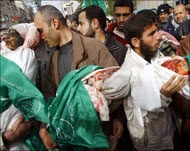.jpg) |
| Palestinian baby - died from Israel's humanitarian bombing |
Prime Minister Benjamin Netanyahu (center) seen during a welcome ceremony for the IDF aid delegation that arrived back from Nepal at Ben Gurion Airport, May 12, 2015. (photo credit: Haim Zach/GPO)
The prime minister then used to occasion to take a swipe at the Jewish state’s arch-enemy.
“Did anyone see the Iranian delegation in Nepal?” he asked rhetorically. “The Iranians send delegations to countries in the region and around the world not to save lives, but to sow death, ruin and terror, and this is the difference between enlightened democracies and dark regimes based on fanaticism and terror.”
 |
| Israel bombs the Al Quds Hospital |
The Iranians did in fact send financial and humanitarian aid.
Two weeks ago, at a press conference in the Foreign Ministry’s situation room, then-foreign minister Avigdor Liberman suggested Israel’s efforts in Nepal were not only motivated by a moral imperative to help.
Rather, helping other countries in need is “the most effective kind of diplomacy,” he said. “In crafting a country’s image, nothing is more effective than providing aid.”
Indeed, member states of the Organization for Economic Co-operation and Development are expected to spend a certain percentage of their GDPs on foreign aid, and Israel’s spending is far lower than the OECD standard, Liberman acknowledged. “Like all advanced countries, it’s our duty to help others who suffer from natural disaster. We always came to help, whether it was in Haiti, Japan or Turkey.”
Israelis twice rushed to Turkey after severe earthquakes hit the country: in 1999 and in 2011. Ties between the Jerusalem and Ankara had their ups and downs over the years, but it would hard to argue that Israeli disaster aid had any significant beneficial impact on the bilateral relationship.
Similarly, Israel in 1988 sent a rescue mission to Armenia after an earthquake, but ties have not improved as a result. Frosty relations between Jerusalem and Yerevan stem partially from Israel’s refusal to recognize the Armenian genocide, and Israel’s aid did nothing to thaw bilateral ties.
Israel’s economic ties with Japan — where the IDF treated 202 patients in an advanced medical clinic after a March 2011 earthquake — improved in recent years, but this is likely attributable to Netanyahu’s concerted pivot east.
Israel’s help during the quake temporarily improved its public standing there, especially in the immediate aftermath of the catastrophe, but by and large Israel’s image in Japan, and Tokyo’s voting pattern at the UN, remained the same, experts say.
‘Even if there is any diplomatic dividend to what we’re doing, it is marginal’
Another argument supporting the claim that Israel acts altruistically in helping others is the assistance afforded to Syrians who fall victim to the ongoing civil war. Initially, Israel didn’t even publicize the fact that it was treating Syrians in its hospitals and elsewhere.
“Even if there is any diplomatic dividend to what we’re doing, it is marginal,” said Palmor. “We still need to do it, simply because it’s the right thing to do. We have the tools to help and we like to help.”
Israel, of course, doesn’t only reach out to other countries when emergency strikes.
Through the Foreign Ministry’s Mashav (a Hebrew acronym meaning Israel’s Agency for International Development Cooperation), the Jewish state has been assisting countries the world over with countless development projects since 1957.
“For Israel,” David Ben-Gurion, the country’s first prime minister, once said, “development cooperation is both a moral and a political issue, and from both aspects Israel must look upon such aid as a historic mission.”
Helping others is a moral imperative and in some cases Israel can get something in return for its kindness — and there’s nothing wrong with that, according to Dan Meridor, a former MK, minister and deputy prime minister who today serves as president for the Israel Council on Foreign Affairs.
“I think we should do it based on both values and interest basis,” Meridor said. “That’s not always a contradiction. Sometimes it’s not possible to marry interest and values but if you can, this is the best combination.”

